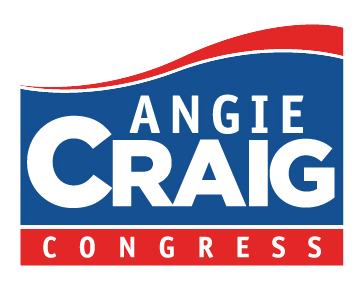By: Gabe Schneider
2/7/2020
Rep. Angie Craig will soon have a bill on President Donald Trump’s desk — the first bill in the current Congress sponsored by a member of the Minnesota delegation to make it anywhere near being signed into law.
On Wednesday, the Second District representative’s bill cleared the House, after already passing in the Senate — an unusual feat considering the current gridlock. Craig says the bill’s intention is simple, but necessary: The Payment Integrity Information Act of 2019 aims to curb billions of dollars of improper payments made by federal agencies to government contractors.
The nonpartisan Government Accountability Office, a congressional office that provides auditing and evaluation, described improper payments in a 2019 report as “a long-standing, significant problem in the federal government” and estimated that $141 billion in improper payments were made in fiscal year 2017; payments that should not have been made or were made in incorrect amounts.
The Improper Payments Information Act of 2002 first prompted federal agencies to identify improper payments and report them. But, the GAO’s 2019 report suggested that the government is still unable to identify the full extent to which these payments occur.
Craig’s bill attempts to tackle both problems: The bill would improve the ways agencies identify programs with the highest risk of improper payments and require agencies to develop plans to prevent improper payments before they happen.
“We’ve seen overpayment to defense contractors. We’ve seen underpayment to folks who are on social security,” Craig said. “So it’s how can we make sure that the agencies have the right quality control checks in place.” Craig said the total amount of funding lost to inefficient government spending could easily fund several new government programs.
“My goodness, $1.4 trillion has been inappropriately paid over the last 10 years in this country,” Craig said. “We could fund special education several times over with that level of resource.”
Over the course of her short career in Congress, Craig has authored numerous bills, but this is the first to get close to becoming law. How’d she do it?
The legislative graveyard
President Donald Trump has complained for the last year that Democrats have spent too much time on impeachment, calling the party “Do Nothing Democrats.”
But prior to any serious discussion of impeachment, House Democrats had passed hundreds of bills. The stumbling block is that they have not made it anywhere near the president’s desk because they haven’t received a vote in the Republican-led Senate.
“The truth of the matter is that House Democrats have passed over 400 bills,” Craig said. “275 are bipartisan and they’re sitting over in the Senate languishing with no action.”
Senate Majority Leader Mitch McConnell has called himself the “grim reaper,” referring to his plans to prevent House bills from reaching the Senate floor. Minnesota’s Sen. Tina Smith has called the Senate a “legislative graveyard.” One strategy Democrats have begun employing to get around the gridlock is to start slipping legislation, like the Liberian Refugee Immigration Fairness Act, into appropriations bills.
But Craig’s bill actually originated in the Senate and had two Republican co-sponsors in the House: Reps. Mark Meadows (R-NC) and Greg Gianforte (R-MT), two allies of President Trump. When Craig heard about the legislation, authored by Sen. Tom Carper (D-DE), she said she saw an opportunity for the House to take up a bill Republicans had already passed in the Senate.
“It’s one of those common sense things that my constituents complain about all the time. You know, ‘Why, why isn’t the U S government working more effectively?” ‘How can we reduce taxpayer waste and fraud and abuse?’”
A larger portfolio
This is not Craig’s first government reform bill. Craig described the bill as part of a larger portfolio of work that she’s pushed in this Congress focused on restoring public trust.
In June of 2018, she authored the HUMBLE Act, which would permanently ban former members of Congress from lobbying, as well as from purchasing individual stock.
“The idea that any member of Congress should be allowed to hold an individual stock is just preposterous,” Craig said. “And if we don’t have these reforms in place and hold ourselves accountable for them, how can the American people have confidence that we’re really here for the right reasons, fighting for them.”
That bill hasn’t moved much since she introduced it, but Craig continues to define her tenure in congress in two terms: working with Republicans and looking for what she frames as common sense reform that her district will appreciate.
“I literally had a former member of Congress come pull me off the House floor once to try to get me to meet with his clients after I’d turned down the meeting,” Craig said.
“And you know, that kind of crap, is what makes my constituents not have faith in this place.”
Read the full story here.
